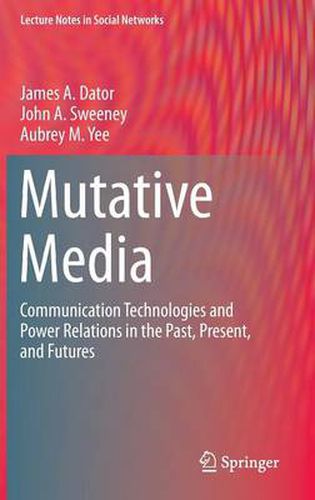Readings Newsletter
Become a Readings Member to make your shopping experience even easier.
Sign in or sign up for free!
You’re not far away from qualifying for FREE standard shipping within Australia
You’ve qualified for FREE standard shipping within Australia
The cart is loading…






This title is printed to order. This book may have been self-published. If so, we cannot guarantee the quality of the content. In the main most books will have gone through the editing process however some may not. We therefore suggest that you be aware of this before ordering this book. If in doubt check either the author or publisher’s details as we are unable to accept any returns unless they are faulty. Please contact us if you have any questions.
Mutative Media is a sweeping examination of how communication technologies have contributed to changes in people’s thoughts and actions, and thus in the power structures of societies, in the past, at present, and in four alternative futures.
We start by surveying what is generally known about the emergence of human language and speech that has enabled humans to extend their organizing abilities beyond that of other hominids. We then review research on the emergence of signs, symbols, and eventually writing, which led to new ways of thinking, acting, and organizing in scribal societies and vastly extended human influence globally. We consider the impact of the printing press in Europe, the Middle East, China, and Korea that led to various ways of thinking and organizing in modern societies, and conclude our historical survey with a discussion of the emergence and impact of electric and electronic communication technologies from the nineteenth century to the present.
After a brief overview of what futures studies is and is not, based on our extensive experience in the field, we present four generic alternative futures, and discuss a prototype of a hybrid, mixed-reality game designed to enable players to experience the power and potential of new communication technologies within four very different environments and conditions. We think you will be intrigued by our surprising findings and what they may mean for future generations!
$9.00 standard shipping within Australia
FREE standard shipping within Australia for orders over $100.00
Express & International shipping calculated at checkout
This title is printed to order. This book may have been self-published. If so, we cannot guarantee the quality of the content. In the main most books will have gone through the editing process however some may not. We therefore suggest that you be aware of this before ordering this book. If in doubt check either the author or publisher’s details as we are unable to accept any returns unless they are faulty. Please contact us if you have any questions.
Mutative Media is a sweeping examination of how communication technologies have contributed to changes in people’s thoughts and actions, and thus in the power structures of societies, in the past, at present, and in four alternative futures.
We start by surveying what is generally known about the emergence of human language and speech that has enabled humans to extend their organizing abilities beyond that of other hominids. We then review research on the emergence of signs, symbols, and eventually writing, which led to new ways of thinking, acting, and organizing in scribal societies and vastly extended human influence globally. We consider the impact of the printing press in Europe, the Middle East, China, and Korea that led to various ways of thinking and organizing in modern societies, and conclude our historical survey with a discussion of the emergence and impact of electric and electronic communication technologies from the nineteenth century to the present.
After a brief overview of what futures studies is and is not, based on our extensive experience in the field, we present four generic alternative futures, and discuss a prototype of a hybrid, mixed-reality game designed to enable players to experience the power and potential of new communication technologies within four very different environments and conditions. We think you will be intrigued by our surprising findings and what they may mean for future generations!